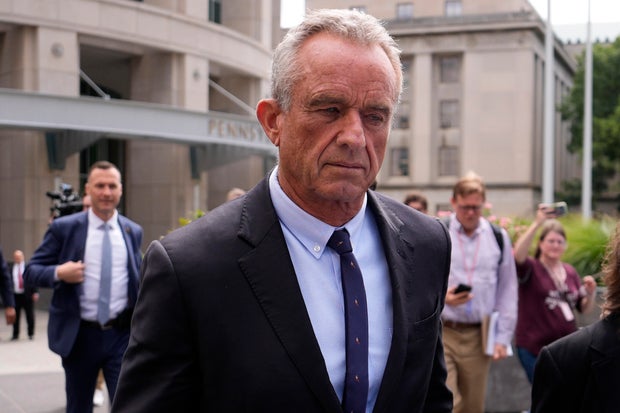Washington — Unlike the Republican and Democratic presidential nominees, Robert F. Kennedy Jr. has faced a costly and time-consuming process to appear on general election ballots as an independent candidate.
Rules vary from state to state, but independent candidates typically have to collect thousands of signatures or be supported by a minor party in order to apply for ballot access.
Kennedy opted to run as an independent last October, abandoning his Democratic primary bid. Since then, Democrats and Republicans have questioned whether the independent candidate would pull support from their voters.
Kennedy’s running mate, Nicole Shanahan, said in a recent interview on the “Impact Theory” podcast that she and Kennedy are considering ending their campaign and backing former President Donald Trump. Shanahan said their presence in the race risks helping elect Vice President Kamala Harris “because we draw votes from Trump.”
“He’s a well-known name,” said Dan Mallinson, an associate professor at Pennsylvania State University at Harrisburg. “He’s different than a lot of other third-party candidates that run.”
So far, Kennedy is on the ballot in two of the seven battleground states — Michigan and North Carolina. Recent CBS News estimates show Harris and Trump are statistically tied in those two states, with Kennedy having 2% support.
“Some of these states are such tight margins that it can matter,” Mallinson said.
Democrats saw a bump after swapping their nominee from President Biden to Harris, largely coming from voters who had previously expressed support for Kennedy, according to a Pew Research Center poll.
Polling from Marquette Law School found that when independent candidates were included on the ballot question, Trump had a slightly larger drop in support than Harris. In an Emerson College poll, Harris’ and Trump’s support evenly decreased by two points with third-party candidates on the ballot. Kennedy’s support dropped in recent months in both polls.
It’s typical of third-party candidates to see their poll numbers drop as it gets closer to Election Day, according to Matthew Foster, a professor at American University.
“When you’re polling months beforehand, people’s choices are a bit mushy,” he said. “They’re more willing to support a third-party candidate at that moment. But when the election comes down to the wire and it really becomes time for the decision, they tend to go either Republican or Democrat.”
Kennedy’s campaign claims to have secured enough signatures in every state and Washington, D.C., except for Kentucky, Mississippi, Rhode Island and Wyoming.
In the map below, states where Kennedy’s campaign says it has met the threshold to appear on the ballot but are still awaiting official confirmation are light blue.
So far, about half of states — those that are dark blue on the map — have confirmed that he will appear on the November ballot.
New York is the only state where he failed to qualify after a judge said Kennedy falsely claimed a New York residence on his nominating petitions. Kennedy is appealing the decision.
Even if he ends up on a majority of ballots, “he won’t make any impact if it’s not the battlegrounds,” Foster said.

- Alaska
- California
- Colorado
- Delaware
- Hawaii
- Indiana
- Iowa
- Louisiana
- Maine
- Michigan
- Minnesota
- Nebraska
- New Mexico
- North Carolina
- Oklahoma
- Oregon
- South Carolina
- Tennessee
- Texas
- Utah
- Vermont
- Washington
- West Virginia
Where RFK Jr.’s ballot status is awaiting official confirmation:
- Alabama
- Arizona
- Arkansas
- Connecticut
- Florida
- Georgia
- Idaho
- Illinois
- Kansas
- Maryland
- Massachusetts
- Missouri
- Montana
- Nevada
- New Hampshire
- New Jersey
- North Dakota
- Ohio
- Pennsylvania
- South Dakota
- Virginia
- Washington, D.C.
- Wisconsin
States where he will not be on the ballot:
- New York

